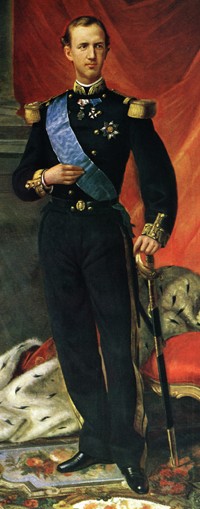 In October 1862, following a power struggle that had lasted nearly two decades, King Otto of Greece lost his throne following a constitutionalist coup while he visited the Peloponnese. Ambassadors from the most powerful European countries persuaded Otto not to resist and he went into exile in Bavaria. The Greeks set up a regency council to rule, which called a national convention to decide the fate of the nation.
In October 1862, following a power struggle that had lasted nearly two decades, King Otto of Greece lost his throne following a constitutionalist coup while he visited the Peloponnese. Ambassadors from the most powerful European countries persuaded Otto not to resist and he went into exile in Bavaria. The Greeks set up a regency council to rule, which called a national convention to decide the fate of the nation.
The Greeks rejected the heir presumptive, Otto’s brother Leopold, as their new king with many preferring Alfred, Duke of Saxe-Coburg and Gotha. Alfred was son of Queen Victoria of Great Britain, who opposed his nomination along with the representatives of France, Great Britain and Russia at the London Conference of 1832, where they decided that no member of the Royal families of their three nations should rule in Greece. Nevertheless, the Greeks insisted on holding a plebiscite in which Alfred received 95% of the votes.
The plebiscite revealed that the vast majority of Greek people wanted to keep a monarchy, so a new candidate had to be found. Eventually, the foreign diplomats and Greek leadership decided upon the seventeen-year-old Prince Wilhelm of Denmark. Prince Christian Wilhelm Ferdinand Adolf Georg (as he was christened) was the second son of Prince Christian of Schleswig-Holstein-Sonderburg-Glücksburg (later King Christian IX of Denmark).
The Greek Assembly unanimously elected Prince Wilhelm as King George I. He received the title ‘King of the Hellenes’, as opposed to ‘King of the Greeks’, the title that Otto had held. Seven months later, on 30th October, George I arrived in Athens for his coronation.
During his early reign George was instrumental in bringing the debates about the constitution to a conclusion. While Greece became a constitutional monarchy in name, political instability often resulted in George imposing minority governments on the people, leading to accusations that he was engaged in absolutism. Nevertheless, his reign lasted for fifty years until his assassination at Thessaloniki in March 1913.
